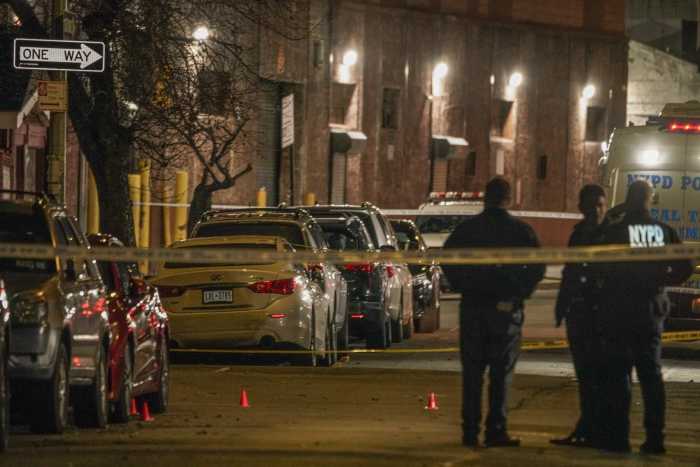Youth held in murder of Chelsea masseur maintained innocence to the end
José Tavares, 17, arrested January 8 in the brutal strangulation murder of Shlomy Rejwan—a masseur who police sources told the dailies had previously been charged with prostitution—maintained all along that in fact he was a victim of sexual abuse in Rejwan’s Chelsea apartment. Tavares told police that a 47-year-old man he called Victor sexually abused him and then killed Rejwan.
Now, we may never know whether Tavares’ claim of innocence was true.
On January 13, while awaiting his return to Rikers Island in a holding pen after a hearing at Manhattan Criminal Court at 100 Centre Street, adjacent to the Tombs, Tavares hung himself with his shirt.
Thomas Antenen, a spokesman for the city Department of Correction, said that as with all deaths in the correctional system, Tavares’ suicide will be investigated by the Death Review Board of the state Department of Correctional Services.
Alan Abramson, a Manhattan attorney who would have represented Tavares had the youth gone to trial on second-degree murder and first-degree arson charges, noted that his client was classified as a “mental observation inmate” and said, “The basic concept is this: He was a 17-year-old boy in the custody of the Department of Correction. They had an obligation to make certain that he was handled in a proper and safe manner. There was a failure to fulfill that obligation.”
Tavares’ stepfather, 32-year old Deyvi Franco, who married the youth’s mother a decade ago and expressed confidence in his stepson’s innocence, told Gay City News, “I want to hear the truth. I want to know what happened to that guy in the Village. I want to know what happened to my stepson.”
The tragic case began on December 27 when firefighters, responding to a blaze at 228 West 18th Street, found Rejwan, an Israeli immigrant, dead with burns on his body. The Medical Examiner’s Office ruled that the death was caused by “compression of the neck,” or strangulation. Police believe the fire was set in the hopes of covering up the murder.
Phone records led the police to Tavares, who lived with his mother and stepfather at 76 Saint Nicholas Place in Washington Heights. The youth maintained that a Colombian immigrant, who he said was 47 and named Victor, was in Rejwan’s apartment with him and subjected him to sexual assault prior to killing the masseur.
No other arrests have been made in the murder, though Barbara Thompson, a spokeswoman for the Manhattan district attorney’s office, confirmed that the homicide case had never been closed and will continue. No other details on the investigation were available from either the D.A.’s office or the police.
Rejwan’s body was found with his hands and feet tied up with an electrical cord, his pants around his ankles, and his mouth gagged. Though he died of strangulation, his body was badly burned in the fire that followed. Police sources told the Daily News that the 5-foot, 10-inch, 180-pound Tavares “definitely played a role” in the murder of Rejwan, who was 6-foot and 196 pounds.
Immediately after reports of Rejwan’s murder surfaced, news stories said that the victim had been arrested on prostitution charges and consequently, as an immigrant, faced deportation. The district attorney’s office would not comment on whether Rejwan had been arrested or convicted.
Mark Thorn, a spokesman for the New York City office of the federal Homeland Security’s Law Enforcement Division, told Gay City News that Rejwan’s name did not match any record in the government’s deportation computer files. A knowledgeable source said that an immigrant charged but not convicted of a crime would not be processed for deportation based on crimes alleged but not proven.
The district attorney’s office was not aware of any prior arrests of Tavares.
In the wake of Tavares’ suicide, Franco, his stepfather, described the youth as “quiet,” “a good boy,” and “a good student” at Manhattan Bridges High School in Hell’s Kitchen, where he was a junior. Asked whether his stepson was gay, Franco said he didn’t know—“He didn’t show that he was gay… He took care of his mother. He came home early and stayed in at night.”
Franco said that Tavares had been “scared” by what he witnessed and for having been “forced” to engage in sex with the man the youth called Victor. The stepfather said Tavares consistently maintained his innocence.
Abramson, who is now representing Tavares’ family, called his late client’s death “tragic and unnecessary.” For now, the family has no specific plans to launch legal action.
“We are evaluating, trying to understand what happened,” Abramson said. “They have to bury their son first.”
Antenen, the correction department spokesman, said that Tavares had been evaluated by a private team of medical and psychiatric professionals and as a result was classified as a “mental observation inmate.” He was not, however, judged to be either “acute” or “sub-acute” in his needs, and therefore was not placed on “constant one-on-one supervision.” Inmates viewed as having more serious psychological problems are given paper bedding and clothing because most jailhouse suicides result from hanging by sheets or articles of clothing.
Antenen said that there has been one suicide in the correctional system since the fiscal year began last July1, five the previous year, and one the year before that.
According to Antenen, Tavares did receive “mental health services.”
At roughly 3 p.m. on January 13, Tavares was in a holding pen at the courthouse awaiting processing for his return to Rikers following his hearing earlier that day. The pen generally holds multiple inmates, but the youth was alone.
Antenen said that a guard had walked by the pen at about 3:10 and Tavares was fine. Five minutes later, a correction officer found him slumped forward on a bench, with his shirt wrapped around his neck and the other end secured to the pen’s bars.
Tavares was pronounced dead at the scene.
gaycitynews.com




































